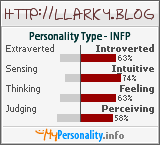"I would wish to emphasize that our 'normal' 'adjusted' state is too often the abdication of ecstasy, the betrayal of our true potentialities, that many of us are only too successful in acquiring a false self to adapt to false realities."- Laing
Depersonalization in a theory that is intended to be a theory of persons is as false as schizoid depersonalization of others and is no less ultimately an intentional act. Although conducted in the name of science, such reification yields false 'knowledge'. It is just as pathetic a fallacy as the false personalization of things.
Uh oh, sounds like somebody is an idealist.
Kraepelin asks him his name. The patient replies by an exasperated
outburst in which he is now saying what he feels is the
attitude implicit in Kraepelin's approach to him: What is your
name? What does he shut? He shuts his eyes.... Why do you give
me no answer? Are you getting impudent again? You don't
whore for me? (i.e. he feels that Kraepelin is objecting because he
is not prepared to prostitute himself before the whole classroom
of students), and so on . . . such an impudent, shameless, miserable,
lousy fellow I've never met with . . . etc.
Now it seems clear that this patient's behaviour can be seen in
Foundations for the understanding of psychosis 31
at least two ways, analogous to the ways of seeing vase or face.
One may see his behaviour as 'signs' of a 'disease'; one may see his
behaviour as expressive of his existence.
So far, I'm not impressed.
I'm at the page 98.
Laing is very annoying to understand as he explains one thing, rambles on it for a while, moves on to another just to go back to whatever he was talking about earlier. He repeats the same shit, but in a more elaborate manner, and in different words.
For instance,
The hysteric pretends that certain highly gratifying activities are
just 1. pretending,
or 2. do not mean anything
or 3. have no special implications
OK DUDE I FUCKING GET IT!
One paragraph earlier,
Being and Nothingness, where he(the hysteric) gives a brilliant phenomenological account of ways of 4.pretending to oneself that 5. one is not 'in' what one is doing
Two paragraphs later,
The hysteric often begins by pretending he is not in his actions
while really actualizing himself through them.
And this goes on and on and on.
He's like Peter from Family guy, when he runs away from the cops singing "Can't touch me".

No hay comentarios:
Publicar un comentario